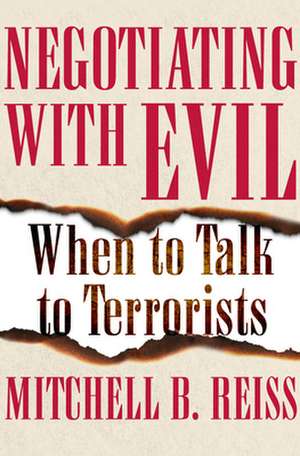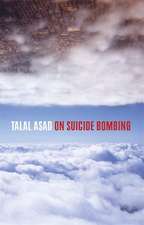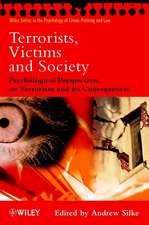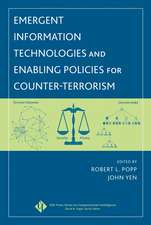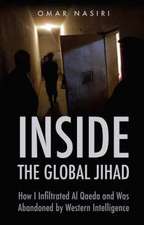Negotiating with Evil: When to Talk to Terrorists
Autor Mitchell B. Reissen Limba Engleză Paperback – 31 aug 2010
In a career spanning decades, Mitchell B. Reiss has been at the center of some of America’s most sensitive diplomatic negotiations. He is internationally recognized for his negotiation efforts to forge peace in Northern Ireland and to stem the nuclear crisis in North Korea. In Negotiating with Evil, Reiss distills his experience to answer two questions more vital today than ever: Should we talk to terrorists? And if we do, how should we conduct the negotiations in order to gain what we want?
To research this book, Reiss traveled the globe for three years, unearthing hidden aspects of the most secret and sensitive negotiations from recent history. He has interviewed hundreds of individuals, including prime ministers, generals, intelligence operatives, and former terrorists in conflict-torn regions of Europe, Asia, North Africa, and the Middle East. The result is a fascinating examination of the different methods countries have employed to confront terrorist movements, the mistakes made, the victories achieved, and the lessons learned.
Negotiating with Evil is a penetrating and insightful look into high-stakes diplomacy in the post-9/11 world and a vital contribution to the global security debate as the United States and its allies struggle to confront terrorist threats abroad and at home.
Preț: 143.02 lei
Nou
Puncte Express: 215
Preț estimativ în valută:
27.37€ • 28.52$ • 22.66£
27.37€ • 28.52$ • 22.66£
Carte disponibilă
Livrare economică 13-27 martie
Preluare comenzi: 021 569.72.76
Specificații
ISBN-13: 9781453258248
ISBN-10: 1453258248
Pagini: 322
Dimensiuni: 154 x 228 x 20 mm
Greutate: 0.48 kg
Editura: Open Road E-Riginal
ISBN-10: 1453258248
Pagini: 322
Dimensiuni: 154 x 228 x 20 mm
Greutate: 0.48 kg
Editura: Open Road E-Riginal
Recenzii
“Peace is not made between friends. It is made between enemies. How political leaders start talking with groups or governments that are fighting and killing their citizens, and ultimately agree to end their conflicts, is one of the most difficult, most important, and least understood challenges facing nations across the world. Mitchell Reiss has done a great service by drawing out the lessons of past efforts by governments to make peace with their enemies—from Northern Ireland to Sri Lanka to Al Anbar, Iraq. This is an excellent and deeply relevant book, and it should be required reading for informed citizens and senior policymakers alike.” —U.S. Senator John McCain
“The distinguished diplomat and scholar Mitchell Reiss takes on one of the most important questions of our messy international age, how to deal with terrorists, and he answers it through a series of fascinating case studies. It’s both an important study and also a compelling set of historical narratives.” —Walter Isaacson, author of Kissinger: A Biography and Einstein: His Life and Universe
“A truly superb analysis of negotiations with controversial groups and states . . . After two decades of personal experience as a mediator and negotiator, I found Negotiating with Evil to be the most comprehensive and thoughtful work on this complex subject. This is a must-read for leaders, negotiators, and those interested in this hot, contemporary topic that faces our current political leadership.” —General Anthony C. Zinni, USMC (Retired)
“Mitchell Reiss tackles head-on the trickiest of questions, whether and when to talk to terrorists. His study is an important and welcome analysis of this complex issue.” —Baroness Manningham-Buller, former Director General of MI5
"Is there ever an appropriate time and a morally supportable reason for a government sit down and bargain with people who have blood on their hands? That's the important but messy question addressed by Mitchell Reiss in his new book, Negotiating With Evil: When to Talk to Terrorists. Reiss, a veteran U.S. diplomat, comes to some conclusions that I think are correct but may make many Americans uneasy."
--Thomas E. Rick, Foreign Policy
--Thomas E. Rick, Foreign Policy
Notă biografică
Mitchell B. Reiss is President of Washington College in Chestertown, Maryland, and was previously Diplomat-in-Residence at the College of William & Mary where he was also Vice Provost for International Affairs and Dean and Director of the Wendy and Emery Reves Center for International Studies. From 2003 to 2005 he served as Director of the Office of Policy Planning at the U.S. State Department under Secretary of State Colin Powell. From 2003 to 2007, he served as the President’s Special Envoy for the Northern Ireland Peace Process with the rank of Ambassador. He received the State Department’s Foreign Affairs Award for Public Service in 2007. He is also the author of Bridled Ambition: Why Countries Constrain Their Nuclear Capabilities and Without the Bomb: The Politics of Nuclear Nonproliferation.
Descriere
In a career spanning decades, Mitchell B. Reiss has been at the center of some of America’s most sensitive diplomatic negotiations. He is internationally recognized for his negotiation efforts to forge peace in Northern Ireland and to stem the nuclear crisis in North Korea. In Negotiating with Evil, Reiss distills his experience to answer two questions more vital today than ever: Should we talk to terrorists? And if we do, how should we conduct the negotiations in order to gain what we want?
To research this book, Reiss traveled the globe for three years, unearthing hidden aspects of the most secret and sensitive negotiations from recent history. He has interviewed hundreds of individuals, including prime ministers, generals, intelligence operatives, and former terrorists in conflict-torn regions of Europe, Asia, North Africa, and the Middle East. The result is a fascinating examination of the different methods countries have employed to confront terrorist movements, the mistakes made, the victories achieved, and the lessons learned.
Negotiating with Evil is a penetrating and insightful look into high-stakes diplomacy in the post-9/11 world and a vital contribution to the global security debate as the United States and its allies struggle to confront terrorist threats abroad and at home.
